-
 Bitcoin
Bitcoin $81,470.6259
-2.28% -
 Ethereum
Ethereum $1,790.7527
-2.95% -
 Tether USDt
Tether USDt $0.9999
0.03% -
 XRP
XRP $2.0607
-6.00% -
 BNB
BNB $591.1549
-2.91% -
 Solana
Solana $124.2009
-1.34% -
 USDC
USDC $1.0000
0.01% -
 Dogecoin
Dogecoin $0.1621
-5.61% -
 Cardano
Cardano $0.6372
-6.99% -
 TRON
TRON $0.2326
0.82% -
 Toncoin
Toncoin $3.8888
0.80% -
 Chainlink
Chainlink $13.0942
-5.24% -
 UNUS SED LEO
UNUS SED LEO $9.1023
-5.55% -
 Stellar
Stellar $0.2605
-3.86% -
 Avalanche
Avalanche $18.3294
-6.73% -
 Shiba Inu
Shiba Inu $0.0...01207
-4.91% -
 Sui
Sui $2.2362
-7.91% -
 Hedera
Hedera $0.1579
-8.64% -
 Polkadot
Polkadot $3.9790
-4.28% -
 Litecoin
Litecoin $81.6801
-5.49% -
 MANTRA
MANTRA $6.1848
-3.34% -
 Bitcoin Cash
Bitcoin Cash $291.7782
-5.06% -
 Dai
Dai $0.9999
-0.02% -
 Bitget Token
Bitget Token $4.4587
-4.83% -
 Ethena USDe
Ethena USDe $0.9999
-0.01% -
 Pi
Pi $0.6892
-10.83% -
 Hyperliquid
Hyperliquid $12.5163
-0.38% -
 Monero
Monero $215.9594
-0.93% -
 Uniswap
Uniswap $5.7942
-3.66% -
 Aptos
Aptos $5.1254
-4.01%
How to participate in IDO (Initial Decentralized Offering) in Trust Wallet?
Trust Wallet enables users to participate in IDOs on DEXs, but thorough research is crucial due to significant risks like rug pulls and token volatility.
Mar 28, 2025 at 10:42 pm
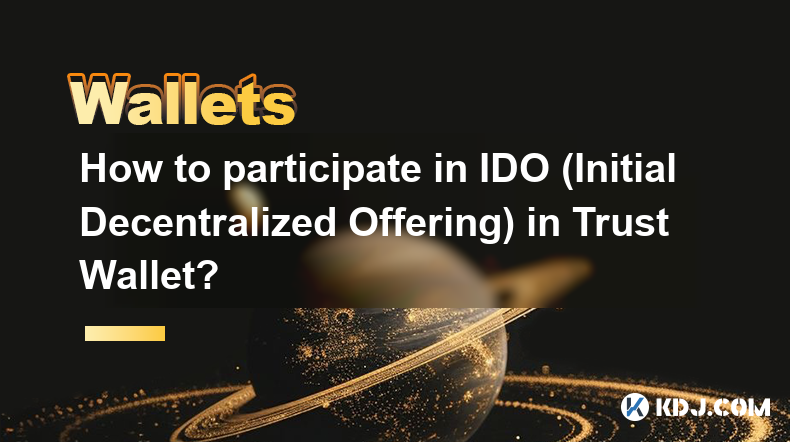
Understanding IDOs and Trust Wallet's Role
Initial Decentralized Offerings (IDOs) are a fundraising method used by cryptocurrency projects to raise capital. Unlike Initial Coin Offerings (ICOs), IDOs leverage decentralized exchanges (DEXs) to distribute tokens, often minimizing the risks associated with centralized platforms. Trust Wallet, a popular mobile cryptocurrency wallet, plays a crucial role by providing access to these DEXs, allowing users to participate in IDOs. It's important to remember that participation in IDOs involves significant risk, and potential investors should thoroughly research any project before committing funds.
Step-by-Step Guide to Participating in IDOs via Trust Wallet
Participating in an IDO through Trust Wallet typically involves several steps. The exact process might vary depending on the specific IDO and the DEX being used. However, the general process usually follows these steps:
Step 1: Acquire the Necessary Cryptocurrency: Most IDOs require you to hold a specific cryptocurrency, often the native token of the DEX being used (e.g., BNB for PancakeSwap, AVAX for Trader Joe). You will need to acquire this cryptocurrency and transfer it into your Trust Wallet.
Step 2: Connect Trust Wallet to the DEX: Once you have the required cryptocurrency in your Trust Wallet, you need to connect your wallet to the decentralized exchange hosting the IDO. This usually involves opening the DEX's website or app in your browser and selecting Trust Wallet as your connection method.
Step 3: Participate in the IDO: After connecting your wallet, navigate to the IDO's page on the DEX. You'll usually find instructions on how to participate, which might involve swapping your existing cryptocurrency for the project's new token. Be sure to carefully read and understand all instructions before proceeding. Always double-check the contract address to ensure you are interacting with the legitimate IDO.
Step 4: Claim Your Tokens: Once the IDO is complete, you might need to claim your newly acquired tokens. The exact process for claiming will depend on the specific IDO. Follow the instructions provided by the project team.
Step 5: Understand Gas Fees: Remember that using decentralized exchanges incurs transaction fees (gas fees). These fees can vary significantly depending on network congestion. Ensure you have sufficient funds to cover these fees before participating.
Choosing a Reputable IDO and DEX
It is crucial to carefully vet any IDO before investing. Not all IDOs are created equal, and many are scams. Here are some factors to consider:
Project Whitepaper: A well-written whitepaper provides detailed information about the project's goals, team, technology, and tokenomics. Thoroughly review this document before participating.
Team Transparency: Research the team behind the project. Are they experienced and transparent about their identities and backgrounds?
Community Engagement: A strong and active community is a good sign. Engage with the community to gauge the level of interest and support for the project.
DEX Reputation: Choose a reputable and established DEX. Using a well-known and secure DEX can minimize your risk of encountering scams or security vulnerabilities.
Security Best Practices for IDO Participation
Security should be your top priority when participating in IDOs. Here are some essential security practices:
Use a Hardware Wallet: While Trust Wallet is convenient, consider using a hardware wallet for added security, especially for larger investments.
Enable Two-Factor Authentication (2FA): Always enable 2FA on your Trust Wallet and any DEX you use. This adds an extra layer of security to protect your account.
Verify Contract Addresses: Double, even triple-check the contract address of the IDO before interacting with it. Scammers often create fake contracts to steal funds.
Only Use Official Channels: Be wary of unofficial websites or social media accounts claiming to be associated with the IDO. Only use official communication channels provided by the project team.
Stay Updated: Keep your Trust Wallet and any connected DEXs updated with the latest security patches.
Understanding the Risks Involved in IDOs
IDOs carry inherent risks, and it's essential to be aware of them before participating. These risks include:
Rug Pulls: This is a common scam where developers abandon a project after raising funds.
Token Volatility: The value of newly launched tokens can be extremely volatile, leading to significant losses.
Smart Contract Vulnerabilities: Bugs in the smart contract code can lead to the loss of funds.
Regulatory Uncertainty: The regulatory landscape for cryptocurrencies is constantly evolving, and this uncertainty can affect the value of your investment.
Lack of Due Diligence: Investing without proper research can lead to significant losses.
Frequently Asked Questions
Q: Is Trust Wallet the only wallet I can use for IDOs?
A: No, many other wallets support IDOs, including MetaMask, Ledger, and Trezor. The choice depends on your preference and security needs.
Q: Are all IDOs legitimate?
A: No. Many IDOs are scams, so thorough research and due diligence are crucial. Look for red flags like anonymous teams, unrealistic promises, and poor documentation.
Q: How do I choose a reputable DEX for IDOs?
A: Choose established DEXs with a strong track record, active communities, and robust security measures. Consider factors like the DEX's trading volume and the security audits it has undergone.
Q: What are gas fees, and how much do they cost?
A: Gas fees are transaction fees on blockchain networks. Their cost varies depending on network congestion and the complexity of the transaction. Always check the estimated gas fee before confirming a transaction.
Q: What happens if the IDO fails?
A: If the IDO fails, you might lose some or all of your investment. The level of loss depends on the nature of the failure and the terms of the IDO.
Q: Can I use Trust Wallet to participate in IDOs on all DEXs?
A: Trust Wallet supports many DEXs, but not all. Check if the specific DEX hosting the IDO is compatible with Trust Wallet before attempting to participate.
Q: What should I do if I think I've encountered a fraudulent IDO?
A: Report the fraudulent activity to the relevant authorities and the DEX hosting the IDO. Warn others about the scam to prevent further losses. Do not attempt to recover your funds yourself; this could expose you to further risks.
Disclaimer:info@kdj.com
The information provided is not trading advice. kdj.com does not assume any responsibility for any investments made based on the information provided in this article. Cryptocurrencies are highly volatile and it is highly recommended that you invest with caution after thorough research!
If you believe that the content used on this website infringes your copyright, please contact us immediately (info@kdj.com) and we will delete it promptly.
- Bearish Clouds Continue to Hover Over the Crypto Markets, BTC Drops Below $82K
- 2025-03-31 17:50:12
- With a Growing Community, Built-in AI Utility, and a Presale Heating Up Fast, It's Drawing Early Comparisons to SHIB's Legendary Rise
- 2025-03-31 17:50:12
- Updated Dogecoin (DOGE) Price Today – March 31, 2025
- 2025-03-31 17:45:12
- Pi Coin (Pi) Price Prediction Today (March 30): Targeting the $0.70–$0.72 Range
- 2025-03-31 17:45:12
- Elon Musk Brushes Aside Rumors Connecting US Government Efficiency Initiative to Dogecoin
- 2025-03-31 17:40:12
- A notable investor in the Pepe ($PEPE) coin has made a significant move, selling off a substantial portion of their holdings.
- 2025-03-31 17:40:12
Related knowledge

How to easily generate a Bitcoin payment address
Mar 29,2025 at 10:49am
Generating a Bitcoin payment address might seem daunting, but it's actually quite straightforward. This process is crucial for receiving Bitcoin, as each transaction requires a unique address. Understanding how this works is fundamental to using Bitcoin effectively. This guide will walk you through the simple steps, regardless of your technical experti...
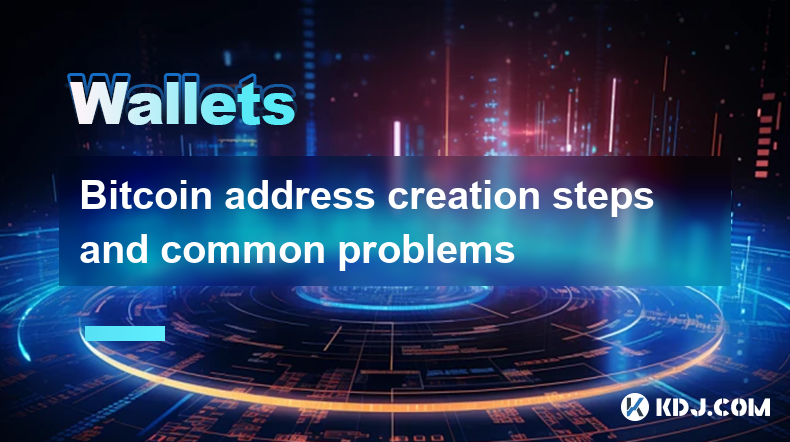
Bitcoin address creation steps and common problems
Mar 30,2025 at 06:07am
Understanding Bitcoin AddressesA Bitcoin address is a unique identifier, similar to a bank account number, used to receive Bitcoin. It's a string of alphanumeric characters generated from a public key, derived from your private key. Understanding the distinction between public and private keys is crucial for Bitcoin security. Your private key should be...
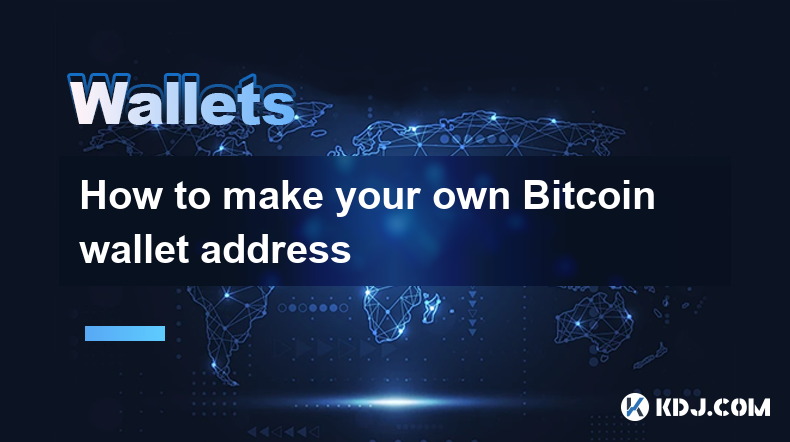
How to make your own Bitcoin wallet address
Mar 29,2025 at 08:42pm
Creating your own Bitcoin wallet address is crucial for securing and managing your Bitcoin holdings. It allows you to independently receive and send Bitcoin without relying on third-party services. This process involves understanding the different types of wallets and choosing the one that best suits your needs and technical expertise. Incorrectly gene...
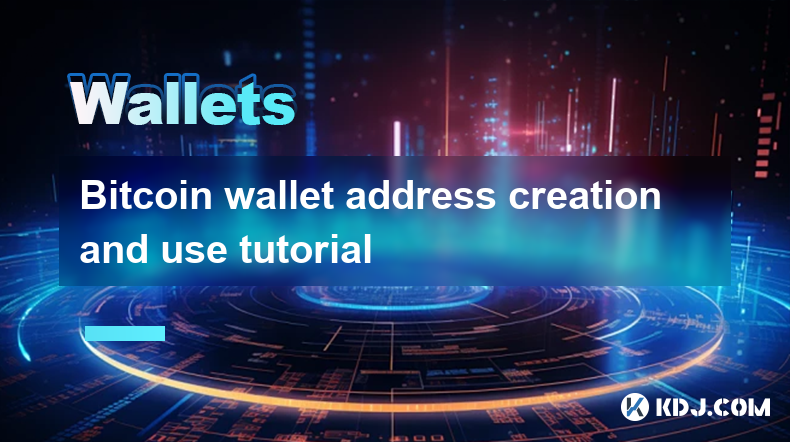
Bitcoin wallet address creation and use tutorial
Mar 29,2025 at 10:14pm
Understanding Bitcoin Wallet AddressesA Bitcoin wallet doesn't store Bitcoin in the way a traditional bank account does. Instead, it stores private keys, which are cryptographic secrets allowing you to access and spend your Bitcoin. Your Bitcoin address, on the other hand, is a public identifier, like an email address, that others can use to send you B...

Bitcoin address generation and secure storage guide
Mar 30,2025 at 08:07am
Understanding Bitcoin AddressesA Bitcoin address is essentially your public key, a string of alphanumeric characters used to receive Bitcoin. It's analogous to your bank account number. Unlike your private key, which is crucial for spending your Bitcoin, your address can be shared publicly without compromising your funds. Generating a new address is sim...
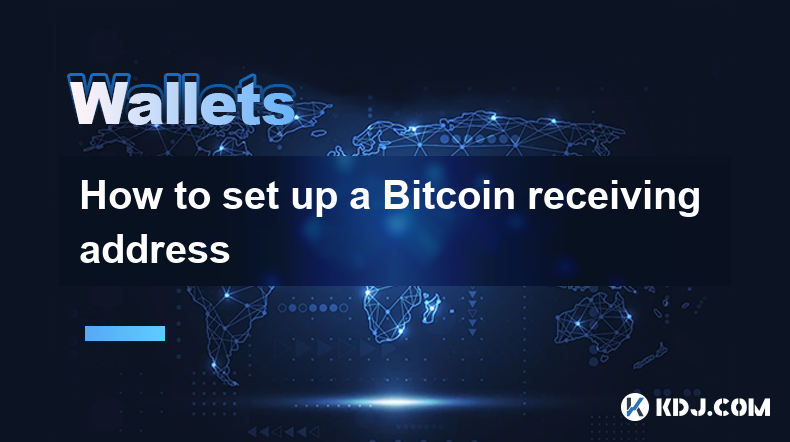
How to set up a Bitcoin receiving address
Mar 30,2025 at 06:14pm
Understanding Bitcoin Receiving AddressesA Bitcoin receiving address is essentially your unique identifier on the Bitcoin network. It's a string of alphanumeric characters that allows others to send Bitcoin to you. Think of it like your bank account number, but specifically for Bitcoin. You need a receiving address to receive Bitcoin. Crucially, you ca...

How to easily generate a Bitcoin payment address
Mar 29,2025 at 10:49am
Generating a Bitcoin payment address might seem daunting, but it's actually quite straightforward. This process is crucial for receiving Bitcoin, as each transaction requires a unique address. Understanding how this works is fundamental to using Bitcoin effectively. This guide will walk you through the simple steps, regardless of your technical experti...

Bitcoin address creation steps and common problems
Mar 30,2025 at 06:07am
Understanding Bitcoin AddressesA Bitcoin address is a unique identifier, similar to a bank account number, used to receive Bitcoin. It's a string of alphanumeric characters generated from a public key, derived from your private key. Understanding the distinction between public and private keys is crucial for Bitcoin security. Your private key should be...

How to make your own Bitcoin wallet address
Mar 29,2025 at 08:42pm
Creating your own Bitcoin wallet address is crucial for securing and managing your Bitcoin holdings. It allows you to independently receive and send Bitcoin without relying on third-party services. This process involves understanding the different types of wallets and choosing the one that best suits your needs and technical expertise. Incorrectly gene...

Bitcoin wallet address creation and use tutorial
Mar 29,2025 at 10:14pm
Understanding Bitcoin Wallet AddressesA Bitcoin wallet doesn't store Bitcoin in the way a traditional bank account does. Instead, it stores private keys, which are cryptographic secrets allowing you to access and spend your Bitcoin. Your Bitcoin address, on the other hand, is a public identifier, like an email address, that others can use to send you B...

Bitcoin address generation and secure storage guide
Mar 30,2025 at 08:07am
Understanding Bitcoin AddressesA Bitcoin address is essentially your public key, a string of alphanumeric characters used to receive Bitcoin. It's analogous to your bank account number. Unlike your private key, which is crucial for spending your Bitcoin, your address can be shared publicly without compromising your funds. Generating a new address is sim...

How to set up a Bitcoin receiving address
Mar 30,2025 at 06:14pm
Understanding Bitcoin Receiving AddressesA Bitcoin receiving address is essentially your unique identifier on the Bitcoin network. It's a string of alphanumeric characters that allows others to send Bitcoin to you. Think of it like your bank account number, but specifically for Bitcoin. You need a receiving address to receive Bitcoin. Crucially, you ca...
See all articles






















































































